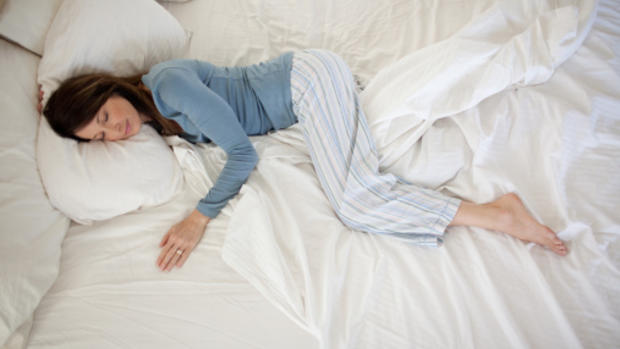Tablets and e-book readers can interfere with sleep
Curling up in bed with your tablet or e-book reader may sound like a cozy way to unwind at the end the day, but it could actually keep you from getting a good night's sleep.
A new study finds that using light-emitting electronic devices such as iPads and e-readers with illuminated screens in the hours before bedtime makes it harder to fall asleep and get the deep sleep you need to feel rested the next morning.
For the study, researchers at Brigham and Women's Hospital in Boston had people read for four hours in the evenings using either an iPad or a regular printed book. Then at 10 p.m., it was lights out. The researchers monitored the participants' levels of melatonin, a hormone that helps regulate the sleep cycle, as well as the amount of sleep they got and how alert they were the next morning.
What they discovered was that people who read on the electronic tablets took 10 minutes longer to fall asleep and had significantly less REM [rapid eye movement] deep sleep during the course of the night, as compared to people who read on paper.
In the morning, the e-reading group also found it harder to wake up and feel fully alert -- even when they'd had a full 8 hours of sleep.
Scientists say the bluish light from the electronics appears to have an impact on the brain.
"Exposure to the blue-enriched light from these devices shifts our circadian rhythms to a later hour, suppresses the release of the sleep-promoting hormone melatonin, and makes it more difficult for us to fall asleep," Dr. Charles Czeisler of Brigham and Women's Hospital and Harvard Medical School, one of the authors of the study, told CBS News.
Doctors say adults need 7 to 9 hours of sleep to function at their best, but about a third of Americans regularly get by on less. Sleep deprivation can take a serious toll on health; among other things, it's been linked to an increase risk of heart disease, diabetes and mood problems.
Not only that, lack of sleep is also associated with weight gain. One recent study found children who don't get enough sleep are almost twice as likely to be obese by their teenage years.
"When you don't get enough sleep it interferes with the production of hormones that are associated with weight and appetite," Karen Bonuck, PhD, the lead author of the study on children and a professor at Albert Einstein College of Medicine of Yeshiva University in New York, told CBS News.
The authors of the latest study echoed that concern with regard to adults as well. "One of our major concerns is that sleep deficiency is associated with an increased risk of cardiovascular disease, metabolic disease like obesity and diabetes," Czeisler said.
"We live in a sleep-restricted society, in general," another of the authors, Anne-Marie Chang, assistant professor of biobehavioral health at Penn State, said in a press statement. "It is important to further study the effects of using light-emitting devices, especially before bed, as they may have longer term health consequences than we previously considered."
Although the researchers conducted their study using iPads, they also tested the light emitted by other electronic devices and said the iPhone, Kindle Fire and Nook Color were similar, though not quite as bright. The regular Kindle reader does not have a lit screen.
The study was published Monday in the Proceedings of the National Academy of Science.
